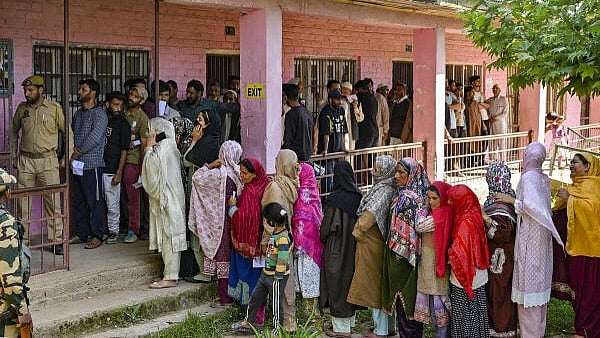
People wait in queues to cast their votes at a polling booth during the sixth phase of Lok Sabha elections.
Credit: PTI File Photo
Srinagar: The banned Jamaat-e-Islami Jammu and Kashmir (JeI) is reportedly plotting a return to the political landscape by discreetly supporting proxy candidates in the forthcoming assembly elections.
Sources close to the organisation indicate that despite its official ban, the JeI is quietly mobilising support and identifying loyalists to contest key constituencies across the Valley as independents.
“We’ve decided to field candidates in at least 10-12 constituencies across Kashmir,” a senior Jamaat leader involved in the developments revealed to DH. “Though we can’t run under the Jamaat banner, we aim to maintain a presence in the assembly. By backing independent candidates, we hope to continue our mission within the legal framework, demonstrating our commitment to democracy.”
The JeI, considered the ideological backbone of Hizbul Mujahideen, was banned on February 28, 2019, following the deadly Pulwama attack that claimed the lives of over 40 Central Reserve Police Force personnel.
While the ban dismantled the organisation’s formal political operations, its grassroots network remained robust, particularly in rural strongholds where JeI has historically wielded significant influence.
The organisation hasn’t participated in elections since the 1987 assembly polls, which were widely criticised for alleged rigging. However, in the recent Lok Sabha elections held in May, several top Jamaat leaders cast their ballots for the first time since 1987, signaling a possible return to electoral politics.
In June, the Jamaat announced its willingness to participate in assembly elections if the central government lifted the ban. There were even reports of backchannel discussions between Jamaat representatives and the government regarding the ban and election participation.
However, the Unlawful Activities (Prevention) Tribunal recently upheld the Ministry of Home Affairs' decision to classify the Jamaat as an unlawful association.
Sources suggest the decision to maintain the ban was influenced by security agencies' concerns that any resurgence of the banned organisation could lead to increased polarisation and unrest in the region.
“Security agencies argued that the continued activities of former Jamaat members and sympathizers, who have remained active in local governance and civil society despite the ban, could undermine the progress made in the past five years,” they disclosed.
As the election date approaches, it remains uncertain how Jamaat-backed independents will fare in carving out a presence in the assembly.